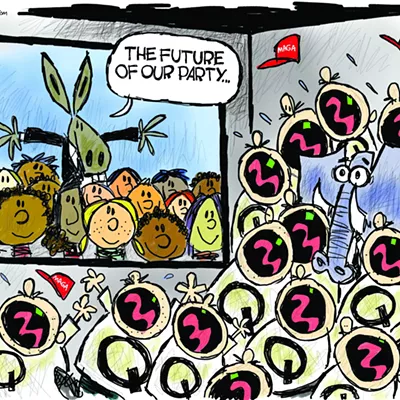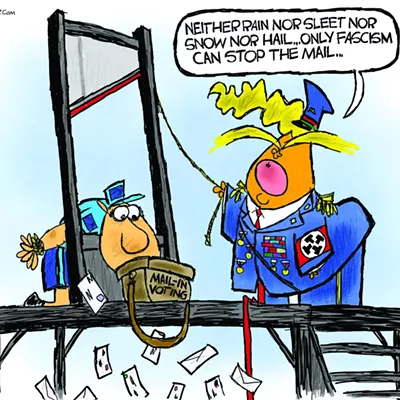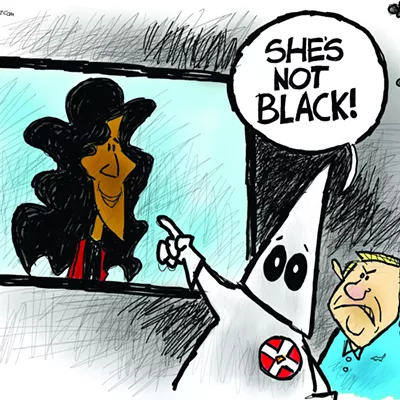With hindsight and all that, from my vantage point as a newspaper editor in a small college town in Appalachian Ohio--a blue island in a sea of red--Bush's victory in this state isn't all that surprising.
Granted, I got seduced by all the optimistic arguments in the days leading up to the election: The idea that a big voter turnout would benefit Kerry, because most of the new registrations supposedly reflected get-out-the-vote drives among likely Democratic voters in urban areas. Or that the telephone polls showing a close race in Ohio failed to accurately reflect the many young people who use cell phones instead of land lines--a demographic statistically likelier to support Kerry. Or the many friends, relatives and coworkers--including my own daughter, brother and niece--motivated to vote for the first time by animosity toward President Bush.
All this and wishful thinking conspired to make me forget some hard realities about Ohio, as well as clues here in my own community.
First of all, anyone who thinks Ohio is a moderate state that suddenly turned conservative red on Nov. 2 hasn't been paying attention. Since big labor began losing its clout in the '80s, Ohio has gradually transformed into a reliably Republican state. Both houses of the General Assembly have been dominantly Republican for many years, as has the governor's office. Ohio's congressional delegation is mostly GOP, and the state Supreme Court has enjoyed a conservative majority since 2002.
With Democrats watching from the sidelines, Ohio's main political spectator sport has been watching the conservative Republicans battle it out against the really conservative Republicans.
The state's news media are mainly corporate-owned, with Sinclair Broadcasting Group and Clear Channel Communications owning a substantial segment of the broadcasting operations. Chains own the vast majority of newspapers, large and small. Most of these chains, especially those serving Ohio's many small communities, are rock-ribbed conservative, or worse, just bottom-line cheap.
So, Ohio might not be Mississippi or Utah just yet, but it's a lot closer to those crimson states than it is to blue Vermont or Maryland, or even Michigan.
At the local and personal level in the days leading up to Nov. 2, clues abounded that it would be premature to assume a Kerry swing.
More and more pickup trucks and SUVs displayed "Sportsmen for Bush" bumper stickers; the NRA began running "Kerry wants your guns" ads in our daily newspaper; the local gun shop's outdoor sign proclaimed "Vote your sport"; and I overheard one of our display advertising reps declare, "I won't let Kerry take away my gun!" (The Athens News ad room--comprised of nice enough people--was mainly pro-Bush.)
Campaign signs began appearing on church lawns, trumpeting "Protect Marriage! Yes on Issue 1." They referred to an amendment initiative that would ban same-sex marriage but also proscribe any legal recognition of unmarried couples, whether gay or straight. (Considered the most extreme such amendment in the nation, Issue 1 easily passed on Nov. 2, along with same-sex marriage bans in 10 other states.)
Pre-election polls predicted the passage of Issue 1, despite opposition from leading Ohio Republicans and corporate leaders (concerned about the economic repercussions of doing away with domestic-partner benefits), the AARP, unions, higher education and other mainstream interests. Aside from the polls, another hint at the grassroots support for this constitutional bigotry was its successful use by our state senator, Joy Padgett, R-Coshocton, in holding back a well-funded election challenge by Terry Anderson, the celebrated AP bureau chief who spent nearly seven years in a terrorist cell in Beirut.
In her campaign ads and fliers, Padgett--whose campaign received special mention in both The New York Times and Village Voice as among the dirtiest in the country--repeatedly accused Anderson of supporting gay marriage, based on his opposition to Issue 1. One infamous flier depicted a hetero married couple on the front, and the words, "One Man, One Woman." Open the mailer, and you saw a photo of Anderson, arms up, with a rainbow flag as a backdrop. Next to it, the words: "Terry Anderson is out of the mainstream. He supports gay marriage. Anderson's position would weaken the family and open the door to rights for same-sex couples."
This wasn't even Padgett's worst--that was reserved for a flier that showed a photo of Anderson interviewing one of his Hezbollah captors years after Anderson's hostage release. It was positioned next to an out-of-context quote from Anderson (which appeared in The Athens News in October 2001) about trying to understand the motivations of people in the Middle East, along with Padgett's charge that Anderson is "soft on terrorism" and part of the "blame America first" crowd.
Padgett, whose whole campaign focused on depicting Anderson as an out-of-touch liberal from New York "where Hillary lives," knew that pulling the gay card especially would resonate with the heartland voters of the 20th Senate District. She was right--she won handily with this crowd, and so did Issue 1.
The presumption that new voter registrations mainly would benefit Democrats was fundamentally flawed. It ignored the power of guns and gays to propel otherwise apolitical people into the voting booth. The voter turnout confirms this, with a big turnout among white evangelicals and self-identified born-again voters in Ohio. Some 76 percent of them voted for Bush, and the gay marriage issue was high among the issues that motivated them.
Many people who live in the heartland--whether in Appalachian Ohio, the plains of Kansas or the foothills of the Ozarks--don't follow the intricacies of politics, economics or foreign policy. They don't have the time or inclination to seek out news media that make them question their assumptions, or consider voting on behalf of their economic interests. They're not dumb or bad; they just have other things to do.
For them, it's enough to know that an amendment will protect traditional marriage and that Kerry will take their guns away. Having between 60,000 and 80,000 Bush volunteers in Ohio to encourage them to protect their rights and morals doesn't hurt either.
So, if the Ohio election sends a message, I'd say it's that we should never forget that support for guns and homophobia in this country is ripe for political exploitation. Don't let them get away with it. Come out fighting and state your case forcefully. Don't be afraid to turn the moral argument against these people. If it's not immoral to discriminate against a group of people based on a status for which they likely have no choice, then what is?










